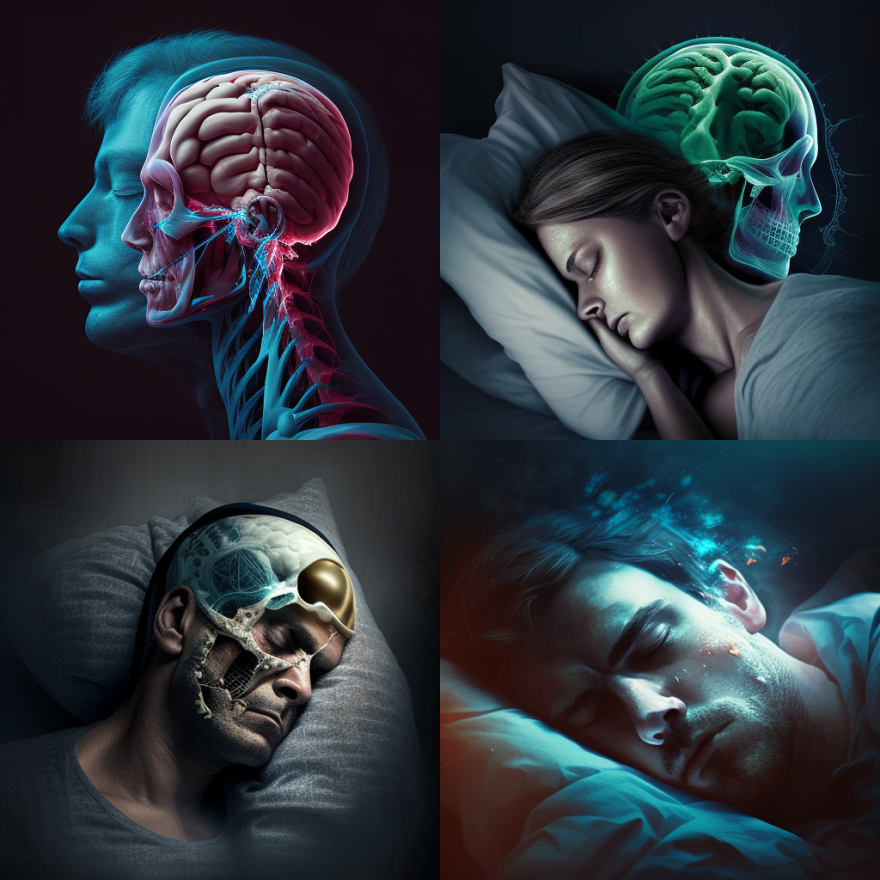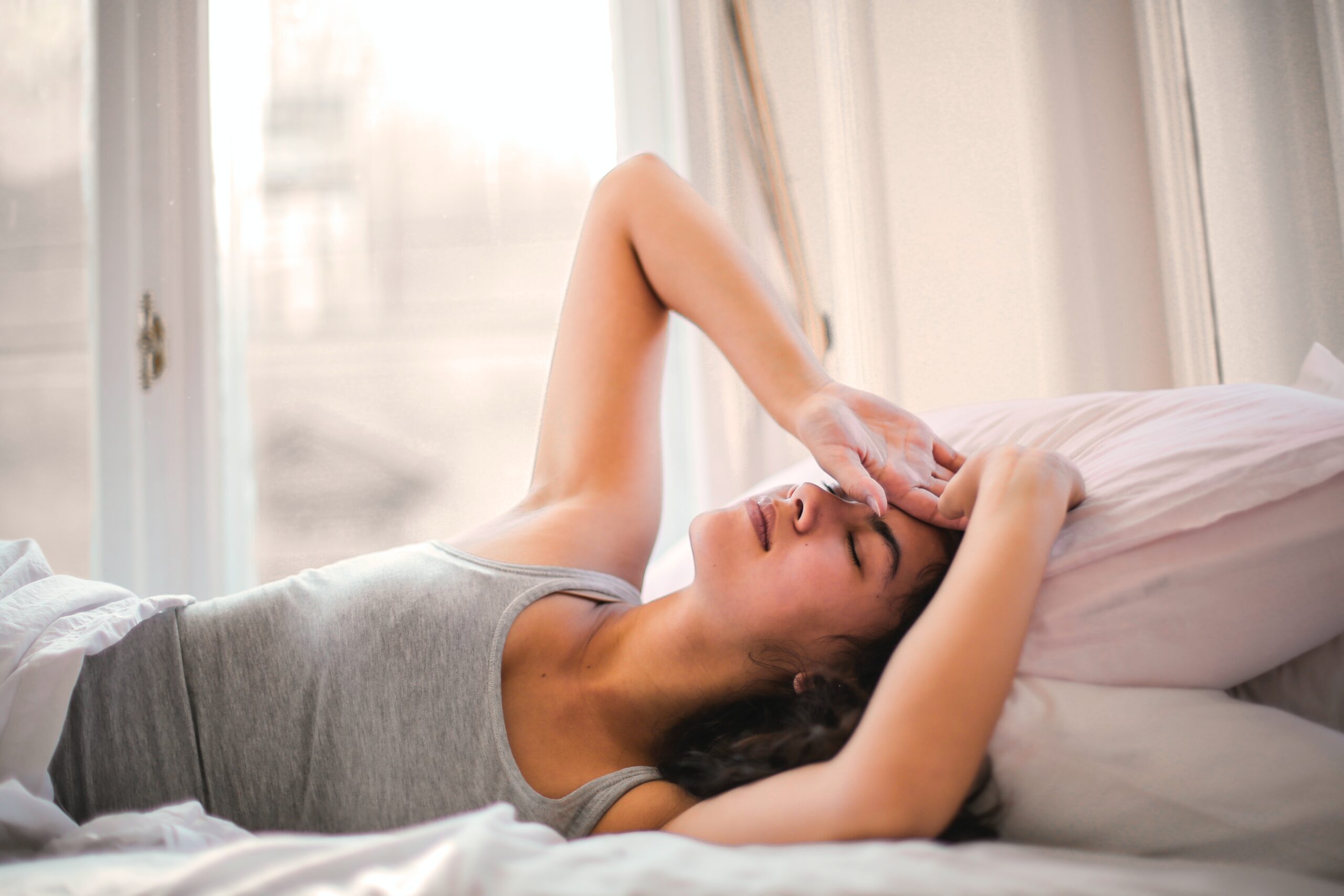Sleep is essential for physical and mental health, but many people struggle to get the rest they need. There are many reasons why someone might be unable to sleep, some of which include:
1-Stress and anxiety:
Anxiety can keep your mind racing and make it difficult to fall asleep or stay asleep. Stress can also trigger the release of cortisol, a hormone that makes it difficult to relax and sleep.
Learn more about this from How Spring Cleaning Can Help Manage Stress, According to Psychologists.
2-Physical discomfort:
Pain or discomfort from an injury or medical condition can make it difficult to sleep. This includes conditions such as arthritis, back pain, or restless leg syndrome.
For tips on alleviating back pain, check out Back Pain Solutions: 7 Tips to Relieve Back Pain.
3-Stimulating activities before bedtime:
Engaging in activities such as watching TV, using a computer, or playing video games can make it difficult to fall asleep because they stimulate the brain and make it difficult to relax.
Advertisement
4-Unhealthy sleep habits or schedule:

Staying up late and sleeping in late on weekends can disrupt your internal sleep-wake cycle, making it difficult to fall asleep at night.
Our bodies have an internal sleep-wake cycle, also known as the circadian rhythm, that regulates our sleep and wakefulness patterns. Staying up late and sleeping in late on weekends can disrupt this internal sleep-wake cycle, making it difficult to fall asleep at night and waking up in the morning during the week.
When we change our sleep schedule, such as staying up late and sleeping in on weekends, it can confuse our bodies and make it harder to fall asleep and wake up at the desired times. Additionally, exposure to bright light in the evening can further disrupt the circadian rhythm, making it even more difficult to fall asleep at night.
It’s best to maintain a consistent sleep schedule and avoid large disruptions to your sleep-wake cycle for better sleep quality and to help regulate the internal circadian rhythm.
5-Caffeine and alcohol consumption:

Consuming caffeine in the evening or drinking alcohol before bed can interfere with sleep. Caffeine stimulates the central nervous system, making it difficult to fall asleep, while alcohol can disrupt sleep patterns and cause restless sleep.
Advertisement
6-Medical conditions:
Certain medical conditions, such as sleep apnea, can cause sleep disturbances and make it difficult to get a good night’s sleep.
Sleep apnea is a sleep disorder characterized by pauses in breathing or shallow breaths while sleeping. These pauses can last from a few seconds to minutes and occur repeatedly throughout the night, disrupting normal sleep patterns. Common symptoms of sleep apnea include loud snoring, excessive daytime fatigue, irritability, and morning headaches. The disorder is caused by a physical blockage of the airway, such as the tongue or other soft tissues collapsing and partially obstructing the airway. Sleep apnea can lead to serious health problems, such as high blood pressure, heart disease, and stroke, if left untreated. Treatment options include lifestyle changes, such as losing weight, sleeping on your side, and avoiding alcohol and sleeping pills, as well as medical devices, such as continuous positive airway pressure (CPAP) machines, or surgery.
7-Side effects of medication:

Some medications, such as beta-blockers or stimulants, can interfere with sleep.
Some medications can have side effects that interfere with sleep, making it difficult to fall asleep or stay asleep.
Beta-blockers, which are commonly used to treat high blood pressure and heart conditions, can cause sleep disturbances by affecting the regulation of sleep hormones such as melatonin.
Stimulants, such as caffeine or medications used to treat attention deficit hyperactivity disorder (ADHD), can interfere with sleep by promoting wakefulness and making it difficult to fall asleep.
Additionally, some medications used to treat anxiety, depression, or other mental health conditions, can have side effects that affect sleep, such as increased wakefulness or vivid dreams. If you think your medication may be affecting your sleep, it’s important to discuss this with your doctor and consider alternative options if necessary.
Advertisement
8-Depression or other mental health issues:

depression and other mental health conditions can have a significant impact on sleep. Depression can lead to persistent feelings of sadness, anxiety, and hopelessness, which can interfere with sleep by making it difficult to fall asleep, stay asleep, or get restful sleep. Additionally, depression can cause physical symptoms such as fatigue, which can make it difficult to stay awake during the day, leading to excessive daytime sleepiness. Other mental health conditions, such as anxiety disorders, bipolar disorder, and post-traumatic stress disorder (PTSD), can also cause sleep disturbances and make it difficult to fall asleep, stay asleep, or get restful sleep. If you are experiencing sleep problems related to mental health, it’s important to seek medical help and treatment, which may include therapy, medication, or lifestyle changes.
9-Pain or discomfort:

Pain or discomfort from an injury or medical condition can make it difficult to sleep.
Pain or discomfort from an injury or medical condition can interfere with sleep, making it difficult to fall or stay asleep. When in pain, the body is in a state of heightened sensitivity, and the discomfort can make it difficult to get comfortable and find a position that allows for sleep. Additionally, pain can cause physical and mental stress, leading to sleep disturbances. If pain is affecting your sleep, it’s important to address the underlying condition and consider using pain management techniques or seeking medical treatment to improve sleep quality.
Advertisement
10-Environmental factors:

Noisy or brightly lit environments can make it difficult to fall asleep.
Light, especially bright or blue light, can trick our brains into thinking it’s daytime, suppressing the production of the sleep hormone melatonin, and making it harder to fall asleep. On the other hand, noise, such as loud music or traffic, can disrupt sleep and cause awakenings, leading to difficulty in falling or staying asleep. It’s best to create a dark and quiet sleep environment for better sleep quality.
If you are struggling to get a good night’s sleep, it’s important to speak with a healthcare professional to determine the underlying cause and develop an appropriate treatment plan. This may include lifestyle changes, such as creating a sleep-conducive environment, or medications to help you sleep. With the right support, it is possible to improve your sleep and feel refreshed and energized each day.
solve the issue:
Note: If you have persistent sleep problems, it is always advisable to consult a healthcare provider for proper evaluation and treatment.
1-Practice good sleep hygiene (e.g. keep a consistent sleep schedule, avoid screens before bedtime)

Good sleep hygiene refers to habits and behaviors that promote quality sleep. Here are some tips for practicing good sleep hygiene:
- Keep a consistent sleep schedule – go to bed and wake up at the same time every day, even on weekends.
- Avoid screens before bedtime – the blue light from screens can disrupt your natural sleep cycle.
- Create a relaxing bedtime routine – read a book, listen to calming music, or take a warm bath.
- Make your sleeping environment comfortable – keep the room dark, quiet, and cool.
- Limit caffeine and alcohol intake – especially before bedtime.
- Exercise regularly – physical activity can help you sleep better, but avoid vigorous exercise before bedtime.
- Limit naps – if you must nap, keep it short and before 3 PM.
By practicing good sleep hygiene, you can create an environment that supports quality sleep, helping you feel more rested and refreshed when you wake up.
2-Exercise regularly
Exercise refers to physical activity that gets your body moving and increases your heart rate. Regular exercise has been shown to have several benefits for sleep:
- Improves Sleep Quality – Exercise can help you fall asleep faster, stay asleep longer, and wake up feeling more refreshed.
- Reduces Stress – Exercise has been shown to reduce stress and anxiety, which can interfere with sleep.
- Regulates Sleep Cycle – Exercise helps regulate the circadian rhythm, which is the natural sleep-wake cycle in your body.
- Increases Feelings of Sleepiness – Physical activity can make you feel more tired and increase feelings of sleepiness, making it easier to fall asleep at night.
It’s important to note that the timing and intensity of exercise can impact sleep. Vigorous exercise should be done in the morning or afternoon and not too close to bedtime. Light exercise, such as yoga or stretching, can be helpful before bedtime.
Consulting a doctor before starting a new exercise routine is recommended, especially if you have a medical condition or are not used to regular physical activity.
3-Reduce caffeine and alcohol intake
Caffeine and alcohol can interfere with sleep and negatively impact its quality.
- Caffeine – Caffeine is a stimulant that can interfere with sleep by blocking the action of adenosine, a chemical in the brain that promotes sleepiness. It’s recommended to avoid caffeine for at least six hours before bedtime.
- Alcohol – Alcohol is a sedative that can help you fall asleep faster, but it can interfere with deep sleep and lead to waking up during the night. It’s best to avoid alcohol before bedtime, or to limit alcohol consumption to one drink or less.
Reducing or avoiding caffeine and alcohol can help improve the quality of your sleep, allowing you to wake up feeling more refreshed and alert. However, everyone’s tolerance to caffeine and alcohol can vary, so it’s important to pay attention to how these substances impact your sleep and adjust your habits accordingly.
Advertisement
4-Manage stress through techniques such as meditation or therapy

Advertisement
Stress and anxiety can interfere with sleep and lead to difficulty falling asleep and staying asleep. Managing stress can help improve sleep quality.
- Meditation – Meditation is a mindfulness practice that involves focusing your attention on the present moment. Regular meditation has been shown to reduce stress, anxiety, and depression, which can improve sleep.
- Therapy – Therapy, such as cognitive-behavioral therapy (CBT), can help you identify and manage the thoughts and behaviors that contribute to stress and anxiety. CBT has been shown to be effective in improving sleep in individuals with insomnia.
- Relaxation techniques – Relaxation techniques, such as deep breathing, progressive muscle relaxation, and guided imagery, can help calm the mind and body, reducing stress and anxiety, and promoting sleep.
It’s important to find what works best for you, as some techniques may be more effective than others, depending on your individual needs and preferences. Consulting a mental health professional can help you determine the best approach for managing stress and improving sleep.
5-Treat underlying medical conditions
Certain medical conditions can interfere with sleep, including:
- Sleep apnea – a disorder characterized by pauses in breathing during sleep.
- Restless leg syndrome – a condition characterized by uncomfortable sensations in the legs and an irresistible urge to move them.
- Chronic pain – ongoing pain can make it difficult to fall asleep and stay asleep.
- Depression and anxiety – these mental health conditions can interfere with sleep and make it difficult to fall asleep and stay asleep.
Treating underlying medical conditions can improve sleep quality and help you feel more rested and refreshed. Treatment options may include:
- Medical devices – such as continuous positive airway pressure (CPAP) machines for sleep apnea or compression stockings for restless leg syndrome.
- Medications – such as pain relievers, anticonvulsants, or sedatives for chronic pain or sleep disorders.
- Psychotherapy – such as cognitive-behavioral therapy for depression or anxiety.
- Lifestyle changes – such as weight loss for sleep apnea or adopting good sleep hygiene for insomnia.
6-Consider seeing a sleep specialist if the problem persists
If you continue to have difficulty sleeping despite trying the methods mentioned above, it may be helpful to see a sleep specialist. A sleep specialist is a healthcare professional who is trained in diagnosing and treating sleep disorders.
A sleep specialist can perform a comprehensive evaluation, including a sleep study, to determine the cause of your sleep problems. They can also recommend appropriate treatment options, such as lifestyle changes, medications, or medical devices.
In some cases, a sleep specialist may refer you to other healthcare professionals, such as a psychologist, to address underlying medical or mental health conditions that may be contributing to your sleep problems.
If you have persistent sleep problems, seeing a sleep specialist can help you get the personalized treatment you need to improve your sleep and overall health.
Insomnia Sleep hygiene Stress management
Dietary habits Bedroom environment Mental health and sleep
Sleep apnea Restless legs syndromeCircadian rhythmSleep aids
- National Sleep Foundation – Sleep Hygiene
- Recommended anchor text: “practicing good sleep hygiene”
- Mayo Clinic – Stress Management
- Recommended anchor text: “managing stress for better sleep”
- Harvard Health – Diet and Sleep
- Recommended anchor text: “dietary choices for improved sleep”

